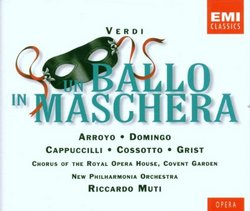Great conductor, great leading soprano
R. M. Simmons | Mississippi | 05/18/2005
(5 out of 5 stars)
"Having a great conductor/orchestra and one of the worlds most celebrated tenors certainly can't hurt, but this recording features a great baritone and a legendary mezzo. Last but not least, it also features a soprano of true distinction as well.
Martina Arroyo could always hold her own with the great sopranos of her day--a fact too easily forgotten. In this performance she actually beats out the competition, competition that includes Milanov, Tebaldi, and Price. Most critics would agree that this is Arroyo's finest recorded performance. And what a performance it is! Vocally, she is resplendent, and the recording is a glowing tribute to a soprano too often overshadowed by her contemporaries, but one who should never for a moment be overlooked or allowed to become an operatic footnote. Arroyo's performance demands that we sit up and take notice--and admire."
A musically superior performance!
Impostazione | New York City Area | 10/15/2005
(5 out of 5 stars)
"Take my word for it, this is the best Ballo out there. I am not fan of Un Ballo in Maschera, Arroyo, Domingo, Grist, Muti or Capuccilli, so I have no reason to shout the biased glories of this performance, neither can I reject the greatness of it. It is superb!
Martina Arroyo's performance is flawless and for the first time she did not bore me, for in spite of the supreme timbre of her voice she usually is not interesting dramatically. But here, she was most dramatic without ever deviating in any way whatever from the score; no scoops, swoops, screams, shrieks, extended notes or shouts, just telling vocalism. At one point, in the duet "Teco io sto" a strange eroticism took over; soft, mellow, slow, like real love between Domingo and Arroyo. This is something I had NEVER heard before in this duet. It was wonderfully graceful.
This is the only recording of Domingo I really value, for though he lacks elan, he has wonderful musicality. Cossotto does not match the others for depth and darkness, but once again musical perfection is the hallmark of this recording and that quality she has. Capuccilli is a little dull and if less musical than the others, his chesty voice delivers and satisfies in way the others do not. You see what I mean? There is something magical about this Ballo. Grist may have lost some of the pearls off her string of a voice, but her characterization is better than her previous Oscar with Leinsdorf, where her voice was absolutely immaculate. Anyway, she is best Oscar ever.
I guess the star is Muti. I think that his attention to detail and strict adherence to the score create something special in Ballo that perhaps would not work as well in Traviata, per se. He chose obediant singers, not known for the depth of their interpretations. They are smart singers, dependable, and musical. I guess that is why I am so surprised that I have been.....perhaps.....moved!
"
Another very good Un Ballo, especially for Muti's conducting
Santa Fe Listener | Santa Fe, NM USA | 12/20/2007
(4 out of 5 stars)
"Rccardo Muti earned his geatest acclaim as a Verdi conductor and a disciplinarian of the often unruly La Scala orchestra. They don't play on this Un Balo, but he makes the New Philharmonia sound earthy and vigorous. I like this rougher approach to Verdi beter than either abbado's over-polish or Solti's manic drive. Both have good versions of Un Ballo that set a standrd for Muti to live up to.
On the whole he succeeds. Domingo delivers one of his prime Verdi roles, perfeclty suited to his voice, as does Cossotto as Ulrica. Cappuccilli gives a strong but not totally memorable Renato -- he never seems to peirce to the heart of any character. If only Arroyo had been a stronger Amelia, this recording might rank at the very top, but she is rather bland and too careful in her phrasing -- the voice per se is lovely and evenly produced, even if it lacks spinto power. Callas and Leontyne Price have nothing to fear.
Overall, this set joins quite a few other first-rate Un Ballos that don't quite reach classic status. Callas and DiStefano are great, but their conductor, Votto, is a dud. Leontyne Price brings great power to the role and is almost matched by Carlo Bergonzi, but Leinsdorf is sluggish and without imagination. My favorite, when all is said and done, remains the 1985 Decca version with Pavarotti and Margaret Price. It reaches the heights when it counts, as in the Act II love scene, and Solti never forgets that Verdi is about passion and the tragic power of fate."


 Track Listings (22) - Disc #1
Track Listings (22) - Disc #1